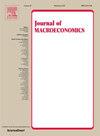Saving behavior and the intergenerational allocation of leisure time
IF 1.5
3区 经济学
Q3 ECONOMICS
引用次数: 0
Abstract
We study how cross-country cultural differences in the intergenerational allocation of leisure time affect savings and working time. To do so, we consider a life-cycle model in which leisure and consumption are complementary and individuals decide on the intertemporal allocation of consumption, on leisure time and on its allocation among individuals of the same generation or of a different one. The latter decision margin determines the equilibrium utility services from leisure that individuals obtain in each life time period. We show that economies in which older individuals obtain higher leisure services have higher savings rates, higher stock of capital per worker and higher fraction of time worked. Using data from the World Value Survey, we provide empirical support to these findings. Our results suggest that cultural differences in leisure allocation play a structural role in shaping cross-country differences in savings and labor supply.
储蓄行为与休闲时间代际分配
我们研究了在休闲时间代际分配方面的跨国文化差异如何影响储蓄和工作时间。为此,我们考虑了一个生命周期模型,其中休闲和消费是互补的,个人决定消费的跨期分配,休闲时间及其在同代或不同代个人之间的分配。后者的决策边际决定了个体在每个生命周期内从休闲中获得的均衡效用服务。我们表明,老年人获得更多休闲服务的经济体具有更高的储蓄率、更高的人均资本存量和更高的工作时间比例。利用世界价值调查的数据,我们为这些发现提供了实证支持。我们的研究结果表明,休闲分配的文化差异在形成储蓄和劳动力供给的跨国差异方面发挥了结构性作用。
本文章由计算机程序翻译,如有差异,请以英文原文为准。
求助全文
约1分钟内获得全文
求助全文
来源期刊

Journal of Macroeconomics
ECONOMICS-
CiteScore
2.50
自引率
7.10%
发文量
53
审稿时长
76 days
期刊介绍:
Since its inception in 1979, the Journal of Macroeconomics has published theoretical and empirical articles that span the entire range of macroeconomics and monetary economics. More specifically, the editors encourage the submission of high quality papers that are concerned with the theoretical or empirical aspects of the following broadly defined topics: economic growth, economic fluctuations, the effects of monetary and fiscal policy, the political aspects of macroeconomics, exchange rate determination and other elements of open economy macroeconomics, the macroeconomics of income inequality, and macroeconomic forecasting.
 求助内容:
求助内容: 应助结果提醒方式:
应助结果提醒方式:


